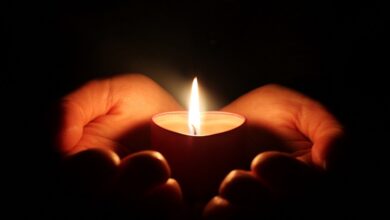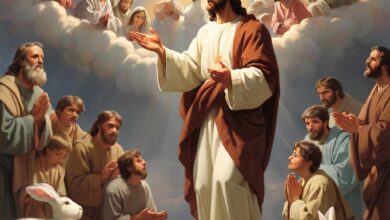Theme: Out of Darkness
Fourth Sunday of Lent – Year A
Readings: 1 Sam 16:1,6-7,10-13; Eph. 5:8-14; Jn 9:1-41
Today, the Fourth Sunday of Lent, Holy Mother, the Church wants us to focus on our call out of darkness into God’s own marvelous light. Dear friends in Christ, the joy of seeing for the first time after a long absence of sight is unspeakable. One can imagine the joy that the man born blind feels after Jesus restores his sight. Christ confers on him, not only his physical sight but also his spiritual sight. He opens his inner eyes of faith and radiates his own light into the mind and heart of the blind man, so that the blind man believes in Jesus as one believes in the sun.
The verse before the Gospel introduces the central point of our celebration. “I am the light of the world, anyone who follows me will have the light of life” (John 8:12). The entire Liturgy therefore celebrates the mystery of Christ – the light of the world; the light that dispels the darkness of our minds and our hearts.
We celebrate Christ who heals our spiritual blindness. The three readings help us to see a sharp contrast between light and darkness; spiritual sight and spiritual blindness. In the First Reading, Samuel struggles as it were in darkness, trying to find a king, but can only succeed to find the young David when he begins to see as God sees.
In the Second Reading, Paul reminds us that we were once in darkness, but now because of our Baptism we are the light in the Lord. We are therefore challenged to be children of the light, for the effects of the light are seen in goodness, in right living and in truth.
In today’s Gospel, the healing of the man born blind invites us to focus on the physical and spiritual aspects of sight and light. In the first part of today’s Gospel, we hear Jesus’ response to a prevalent belief of his time: that misfortune and disability were the result of sin. That belief is why Jesus is asked the question of whose sin caused the man’s blindness – his own or his parents’.
Jesus does not answer directly, but instead gives the question an entirely different dimension – through this man’s disability, God’s power will be made manifest. The healing is controversial because Jesus heals on the Sabbath.
The Pharisees, the religious authorities of Jesus’ time, understood that the law of Moses forbade work (including healing) on the Sabbath. They also have trouble believing that Jesus performed a miracle. To determine whether the man was really born blind, the Pharisees question him and his parents.
The man challenges the leaders of the Synagogue about their assessment of the good that Jesus has done. In turn, they expel the man for questioning their judgment.
The story of the man born blind in the Gospel is not so much about the man being healed, but about seeing as God sees. Here we meet a blind man with sight as compared to the intellectual Pharisees who are blind. The Gospel reminds us that our Baptism illuminates us to see and embrace God’s vision, life, goodness and truth. Our Baptism commits us to be bearers of the truth and to confront the spiritual blindness of the world with the truth.
The passage clearly contrasts light and darkness, faith and the refusal to accept the truth.
The passage leads to a controversy with the Pharisees. Because they are in the darkness of their own prejudice, they refuse to recognize Jesus as the Messiah; they refuse to acknowledge that Jesus has the power to heal the blind man. The blind man gives Jesus the opportunity to show forth once again his own true divine identity for all to see and believe.
In the story, Jesus not only gives the blind man his sight, physical light, but he also gives him the light of faith. When Jesus asks the blind man if he knows the Son of Man, he says, “Who is he sir that I may believe in him?” Jesus says to him, “You have seen him, the one speaking with you is he.” The man then says, “I do believe, Lord.”
On the other hand, the Pharisees, because of their prejudice, are totally blind to Christ and even attribute His miracle to Satan. The story is not simply about the healing of the man born blind and the Pharisee refusing to accept the power of Christ to perform such a miracle. Rather, the story is about you and me in moments of our own spiritual blindness and darkness.
In the selfishness of our hearts; in our inclinations for pleasure; in our material covetousness, we become spiritually blind and lose our spiritual sight.
The message we take home is threefold:
* In Baptism, Christ has healed our blindness and given us the light of faith, so that, like the healed blind man, we may proclaim Christ boldly despite the opposition from those still in darkness.
* Just as the blind man after being healed by Jesus began to witness to Christ, we too are challenged to spread the light of Christ wherever we are, even in times of opposition.
* Just as in the Gospel story, we must not allow dishonesty and the distortion of the truth to dim our light, because Christ is our Light.
Let us today admit our spiritual blindness and pray with St Augustine of Hippo in the spirit of Lent and today’s Gospel: “Lord that we may see.” The Lord will give us light and spiritual insight. We walk in darkness, blind to our own shortcomings and the needs of others; but Christ lights up our way, curing our blindness and leading us to his kingdom.
The greatest of faults is to be conscious of none. The time is drawing near, for the renewal of our baptismal promises in the Holy Saturday Liturgy. May we, therefore, come out of darkness and begin walking in the light of Christ. Amen.

